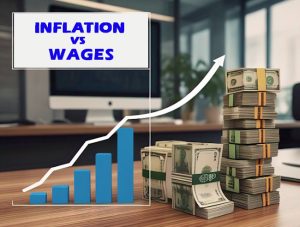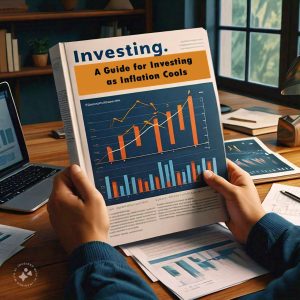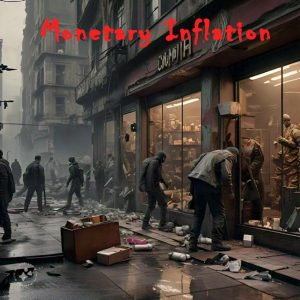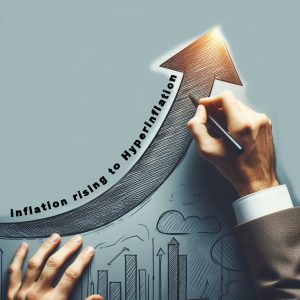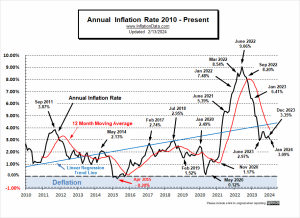It all depends on the type of Deflation. There are actually two types. The deflation that most people are familiar with is the result of a market collapse such as we saw in 2008. Prices of assets (like stocks) fall because of some sort of “accident,” such as the mispricing of mortgage-backed securities and derivatives. When assets lose value quickly, panic sets in, leverage must be liquidated, causing other assets to be sold, creating a "snowball effect" causing a "risk-off" mindset. Consumers cut back on unnecessary purchases, businesses lay-off workers, unemployment skyrockets, and the economy stagnates, etc. But looking even deeper, we find that the “mispricing’ was caused by too much … [Read more...]
The Correlation Between Job Market Turnover and Inflation
Inflation, the rate at which the general level of prices for goods and services rises, erodes purchasing power and poses significant challenges for economies. During periods of high inflation, individuals face increased living costs, prompting many to reassess their employment situations. Further, inflation influences job market turnover rates, as workers seek better opportunities to maintain their financial stability. We will explore the correlation between rising prices and employee mobility, the psychological factors driving job changes during inflationary periods, and the implications for employers navigating this turbulent landscape. By understanding these dynamics, we can gain … [Read more...]
How Inflation Destroys Civilization
The following article by Jörg Guido Hűlsmann was originally published in 2004. Dr. Hűlsmann is a professor of economics at the University of Angers, where he directs the Master in Law and Finance and codirects the double bachelor program in Law and Economics. He teaches classes on macroeconomics, money, banking, and finance. He is the author of Abundance, Generosity, and the State (2023), Krise der Inflationskultur (2013), The Ethics of Money Production (2008), and Mises: The Last Knight of Liberalism (2007). His books and articles have been translated into twenty languages. His current research focuses on the political economy of financial markets, as well as on the theory of money … [Read more...]
Optimize Your Finances as Inflation Cools
The consumer price index, personal consumption expenditures, and producer price index point to cooling inflation, but no one can say for certain what the economy will do next. High inflation rates have a devastating effect on economies and the people within them, so a slower rate of inflation over the next few months and years could make everyone breathe a little easier. However, with so many factors up in the air — the U.S. presidential election and ongoing geopolitical conflicts, among others — you might not want to make any drastic moves with your personal finances. If inflation rates slow down and the economy returns to a more normal healthy state, you should adjust your financial … [Read more...]
What Causes Stagflation?
In my article What is Stagflation, I wrote: The simple definition of Stagflation is a “stagnant economy coupled with price inflation”. Thus the term Stagflation… it has nothing to do with Deer. In other words, in stagflation prices are going up while the economy is going down. The word was coined during the inflationary period of the 1970’s. In the following article Frank Shostak goes into more depth on stagflation. ~ Tim McMahon, editor What is Stagflation? The occurrence of stagflation is associated with a situation of general strengthening in the momentum of prices while at the same time the pace of economic activity is declining. A famous stagflation episode occurred during the … [Read more...]
Inflation Destroys More Than Money
Everyone knows that inflation hurts consumers by raising the cost of their purchases and that it hurts those on fixed incomes the most because although their costs are rising, their income isn't. In addition to impoverishing individuals, inflation has several less obvious ramifications. Perhaps the most insidious and detrimental consequence of inflation is the facilitation of more wars. How Inflation Promotes War Prior to the advent of fiat currencies, if a Monarch wanted to wage war, he had to figure out a way to pay for it. If his treasury wasn't large enough to pay for the means of war, the king would have to either raise taxes, or borrow the money, either way there were limits to how … [Read more...]
4 Key Factors to Consider When Hedging Against Inflation
The FED's target yearly inflation rate in the U.S. is about 2%, but the long term average is more like 3% and depending on ongoing economic conditions, this rate can significantly increase, affecting the financial health of individuals across the country. Though keeping an eye on the economy can help you make decisions to brace against the impact of inflation, developing sound investments can help you protect your wealth no matter the rate. Take a look below for a few central items to consider when preserving your finances against inflation. Diversify your Portfolio Portfolio diversification is crucial for maintaining optimal financial health. Your investments should vary in asset class … [Read more...]
Hyperinflation- How a Trickle Can Turn into a Flood
In 1903, a lawyer in Germany took out an insurance policy and made payments on it faithfully. When the policy came due in twenty years, he cashed it in and bought a single loaf of bread with the proceeds. He was fortunate. If he had waited a few days longer, the money he received would have bought no more than a few crumbs. Germany had been on the usual fractional reserve gold standard prior to World War I, with the Reichsbank—its central bank—expanding the money supply at a “mild” 1–2 percent inflation rate. When war broke out in 1914, the government followed the standard policy of deficit spending rather than attempting to raise taxes. The Reichsbank’s role was to monetize the … [Read more...]
Inflation, High Inflation, and Hyperinflation
The following article was written by Dr. Thorsten Polleit and was originally published in October 2022. Since then, inflation has come down significantly, but his analysis is still valid. Dr. Polleit is Chief Economist of Degussa Bank and an Honorary Professor at the University of Bayreuth. He also acts as an investment advisor. ~Tim McMahon, editor. Inflation, High Inflation, and Hyperinflation The word “inflation” is heard and read everywhere these days. However, since different people sometimes have very different understandings of inflation, here is a definition: Inflation is the sustained rise in the prices of goods across the board. This definition conveys that inflation … [Read more...]
January 2024 Annual Inflation Down Despite High Monthly Inflation
According to the Bureau of Labor Statistics CPI report released on February 13th, Annual Inflation was down to 3.1% in January from 3.4% in December. (but since we calculate it to two digits, it was actually 3.09% in January and 3.35% in December.) Monthly inflation was -0.10% in December and 0.54% in January. But since inflation is highest in the first quarter of the year, these numbers are not unusual. But in January 2023 monthly inflation was 0.80%, so annual inflation is lower in 2024. The BLS's Seasonally adjusted monthly rate for January was 0.30%, the same as December 2023. As you can see from our MIP projection from last month, inflation was at the high end of our range. … [Read more...]


